2024 | October Newswrap: Updates from Member Organizations Worldwide

(Bagnolet: November 7, 2024) On the 16th of October, the International Day of Action for People’s Food Sovereignty and Against Transnational Corporations, La Via Campesina mobilized its regional and local organizations, allies, social movements, and collectives in defense of life, healthy and sovereign food for the people, and the rights of millions of peasants.
According to the 2024 SOFI report the world is still far off track to achieve Zero Hunger by 2030, as global hunger persists after the COVID-19 pandemic with about 2.33 billion people food insecure and unable to afford a healthy diet. It is happening at a time when biodiversity, a key part of food production and life, faces an unprecedented crisis due to habitat destruction and fragmentation, pollution and overexploitation of our commons and oceans through the extractivist models and the industrial agri-food system of transnational corporations. The climate crisis too is worsening.
Thus, La Via Campesina has upped its ante in different institutional governance spaces – such the UN Decade of Family Farming and the Committee on World Food Security-Civil Society and Indigenous People Mechamism, COP16 – demanding an agroecological transition that safeguards local food systems and a new trade framework based on the principles of Food Sovereignty. For this to happen, public policies that prioritize models of peasant production, social, and solidarity economies are urgently required.
In line with the October actions for People’s Food Sovereignty and Against Transnational Corporations, La Via Campesina issued its position on the COP16 on Biological Diversity, held in Cali, Colombia, calling for the strengthening and recognition of the struggle for food sovereignty and agroecological peasant agriculture as the true solutions to biodiversity and climate crises.
In Rome, from the 14th to the 18th of October, at the Global Family Farming Forum on “Halfway through the United Nations Decade of Family Farming (2019-2028) – organized by the United Nations Decade of Family Farming to reflect on the past 5 years of the Decade and strategise for the remaining years, La Via Campesina called for public policies that do not harm family farming but are in favour of food sovereignty. The peasant movement stressed its belief that a systemic transformation that guarantees our rights, environmental and social justice is urgently required.
The UNDFF midterm forum was followed by the 52th plenary session of the United Nations Committee on World Food Security (UN CFS) in which La Via Campesina participated under the Civil Society and Indigenous People Mechanism (CSIPM). Besides calling for a systemic transformation, they condemned the continued use of starvation as a weapon by Israeli occupying forces against Palestinians in Gaza and called for an immediate ceasefire.
La Vía Campesina welcomed the UN CFS’ approval of the Colombian government’s initiative to organize the second International Conference on Agrarian Reform and Rural Development (ICARRD+20). This initiative, the peasant movement believes will contribute towards eradicating hunger and fostering global peace through food sovereignty.
On the 16th October, the Global Food Sovereignty Movement, pressed on with the process of the 3rd Nyéléni Global Forum 2025 emphasizing the urgency for systemic transformation because the world faces profound and intertwined crises requiring urgent systemic change to return power to the people.
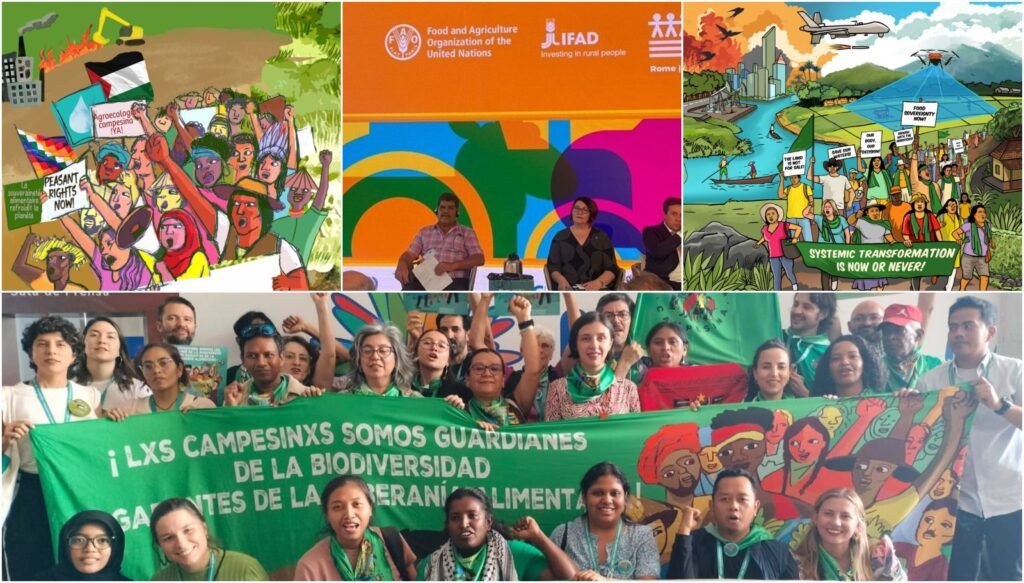
Below we share a brief informative update of the main actions and activities carried out by our member organisations in Asia, Africa, Europe and the Americas this month.
In South Asia, the Karnataka Rajya Raitha Sangha (KRRS) held the third module of its Youth Camp from October 17-20 at the Amritabhoomi peasant agroecology school in Karnataka, India. This camp is part of a series designed to train young farmers in leadership skills and social movement organizing. The event included workshops, discussions, theater, and other activities to provide training on these topics, as well as on the history of peasant struggles in India to promote seed sovereignty, food sovereignty, and social justice.
In Bangladesh, members of the BAFLF intensified their efforts to regularize farmworkers employed at state-run agricultural universities. Throughout October, in regions such as Rangpur, Jhinaidah, Panchagarh, Jessore, Faridpur, and Pabna, laborers posted notices in village households listing the union’s 13 demands as part of a labor rights campaign. These demands include improved wages, better working conditions, and social security benefits for workers on state-run farms across the country. The union also highlighted corruption within the bureaucracy, which has hindered the implementation of a regularization policy issued as far back as 2017.
In Southeast and East Asia, MOKATIL in Timor-Leste hosted the Youth Articulation Assembly for members from the region. Youth representatives from the Philippines, Thailand, South Korea, Indonesia, Japan, Cambodia, Malaysia, and Australia attended the three-day workshop held from October 22 to 25. In addition to theoretical sessions, participants engaged in hands-on practical lessons at the production units managed by MOKATIL and visited the Agricultural Production Center Proclaimer of the Democratic Republic of Timor-Leste, Dr. Francisco Xavier do Amaral, in the municipality of Aileu.
In South Korea, the The Korean Peasants League has announced a set of four demands for the government audit to address the hardships farmers face, including falling rice prices and abnormal weather conditions. The four demands, released in a press statement on the 7th, include: (1) an end to the short-sighted pricing policies that rely on imports, such as Tariff Rate Quotas (TRQ); (2) strengthened national responsibility and fundamental measures to tackle the era of climate disasters; (3) renegotiation of TRQ rice imports and ensuring fair pricing for rice; and (4) a termination of economic policies aiming to make Korea the “world leader in FTAs.”
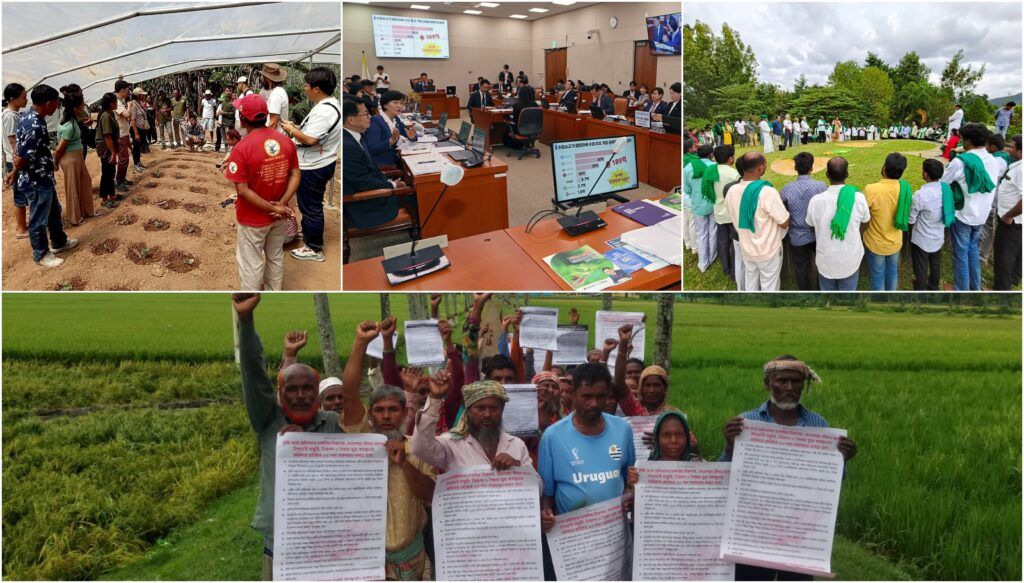
In Southern and Eastern Africa, ESAFF Uganda organised on the 16th of October an exhibit to promote the need for the registration of farmers’ seed varieties. The event was attended by the Minister for Agriculture, Animal Industry and Fisheries who emphasized the need to improve food safety and consumption of nutritious organic food if the nation is to tackle the issue of malnutrition especially among children. ESAFF Uganda also organised a radio talk-show for the peasant women leaders to share the issues discussed at the Women in Agriculture Conference held earlier on, and to promote food sovereignty in order to counter transnational corporations takeover of the Ugandan food system.
In Tanzania, MVIWATA organized an event on the 21st of October which was attended by over 600 students who are part of its environmental and agroecology school clubs to commemorate World Food Sovereignty Day in Njombe region. The encounter focused discussions on the state of Agroecology and food sovereignty in Africa, learning exchange amongst students on various activities of school clubs including tree nursery establishment, agroecological vegetable gardens, agroforeatry initiatives as well as school meal programs. The school clubs are spaces for students to learn more about peasant agroecology.
In Kenya, the Kenyan Peasants League (KPL) organised and conducted civic and popular education on climate policies in four wards (Karura, Kirisura, Masaba and Mountain View wards). The civic education focused on bringing awareness to its members on KPL’s proposed changes to County Climate Change Acts of Nairobi, Migori and Kakamega Counties. They also called for the inclusion of provisions of UNDROP and Climate Justice in the Acts. The KPL also started mobilising its members to be vigilant in defense of their food sovereignty ahead of the 31st of October ruling on GMO ban by the High Court.
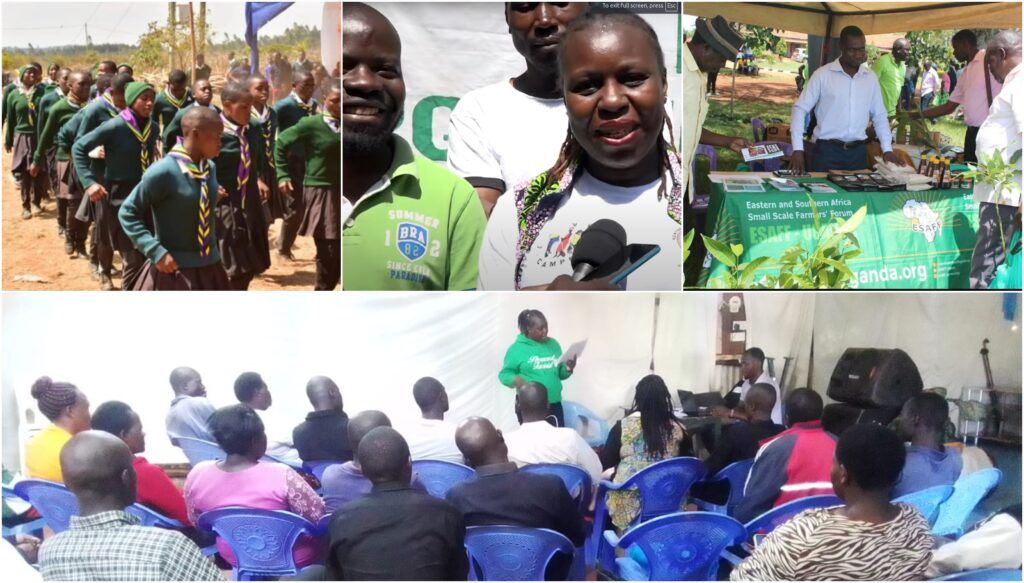
In Europe, on October 12th, the Confédération Paysanne of Ariège gathered 300 people at their peasant festival, focusing on agrivoltaics at the Croquants farm, which faces the risk of a 40-hectare agrivoltaic project on its fertile land. Farmers recalled Bernard Lambert, who fought against mechanization and the loss of farmers, advocating for an alliance between workers and peasants. Today, this spirit lives on: “We are here to produce food, not electricity under the control of energy companies,” they stated, reaffirming their opposition to projects that threaten food sovereignty and the dignity of farmers. The evening continued with a peasant feast and a festive concert.
Uniterre continues to strongly oppose the expansion of highways in Switzerland, particularly between Geneva and Nyon, and on the Wankdorf-Schönbühl section. These projects would lead to the loss of valuable agricultural land and forests, threatening food sovereignty. With the loss of cultivable land and forests, Switzerland’s food self-sufficiency would decrease, while imports and external dependence would increase. This ongoing process of urbanization also compromises biodiversity, which is essential for agriculture and the management of commons, while exacerbating the effects of climate change.
In South America, Fenmucarinap in Peru held the National Forum on Public Policies on Native Seeds. The delegations of the various organisations demanded that the conservation of native seeds be guaranteed in order to ensure food sovereignty. Issues such as the importance of native seeds, agrobiodiversity zones and the right to seeds and climate change were addressed.
The National Peasant Federation of Paraguay, FNC, repudiated and condemned the accusations made by the Minister of Agriculture, Carlos Giménez, against food producers who denounce the abandonment of the State and the lack of policy to protect the national market.
In Honduras, as in many other countries, the growing influence of transnational corporations in the agricultural sector has had a profound and worrying impact on food sovereignty. By monopolising the market and prioritising their economic interests, these corporations have displaced small farmers, deteriorating their marketing opportunities and putting the food security of communities at risk. In this sense, food sovereignty is fundamental because it guarantees the right of peoples to define their own agricultural and food policies, prioritising local and sustainable production over dependence on transnational corporations.
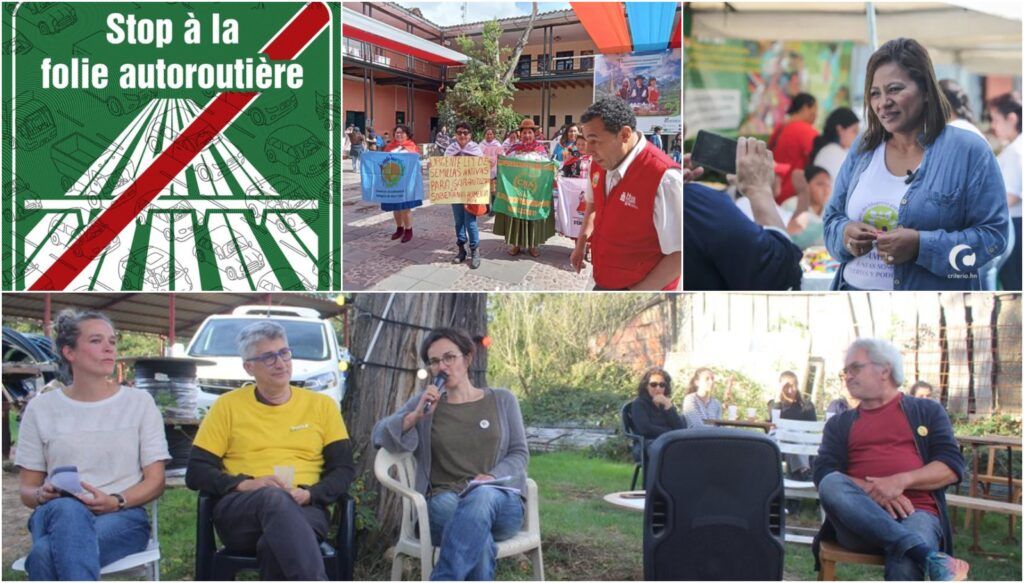
Guatemala has been fighting for years to consolidate the rights of indigenous peoples and peasants, through battles and mobilisations, but it was only during the current Arévalo government that an agrarian agreement was signed. It has been a strong struggle, 106 days in the streets defending the little democracy that remains.
In the Caribbean, Dominican Republic, from 18 to 20 October 2024, the National Confederation of Rural Women (CONAMUCA) held its 9th National Congress at the Centro de Formación y Capacitación Mamá Tingó (CEFCAMATI). This significant event also commemorated its 38 years of organisational life and brought together more than 300 women delegates from 24 federations, representing 227 rural communities representing the different regions and provinces of the country.
On Saturday, October 19, 2024, the youth coordination of the MPP organised a special general assembly for all the Hinche Youth Movement (MJH), held at Sant Lakay’s agroecology school. The gathering brought together 60 delegates from the MJH groups and four MPP facilitators. This assembly was a space for deep reflection and a time for MJH members to connect with each other and with their roots. The goal was clear: to mobilize the youth of the Movement in Hinche (MJH) within the fields and the city, uniting their hands, minds, and hearts toward a strategic vision that responds to Haiti’s national political challenges.
In North America, the Family Farm Coalition in the United States of America hosted the webinar ‘Game Over: Ending Corporate Farming’s Monopoly Game’. The NFFC in partnership with Iowa Citizens for Community Improvement explored the monopolisation of the food and agriculture system and how we can put an end to its twisted game. They revealed how a handful of corporations, led by today’s ‘robber barons’, have managed to take control of the food we eat. They heard from farmers who are actively taking control of their own livelihoods and empowering themselves and others to challenge the status quo. With upcoming elections in the country they also explored promising federal policy efforts that could reshape our food system and how to support a more just and equitable future.
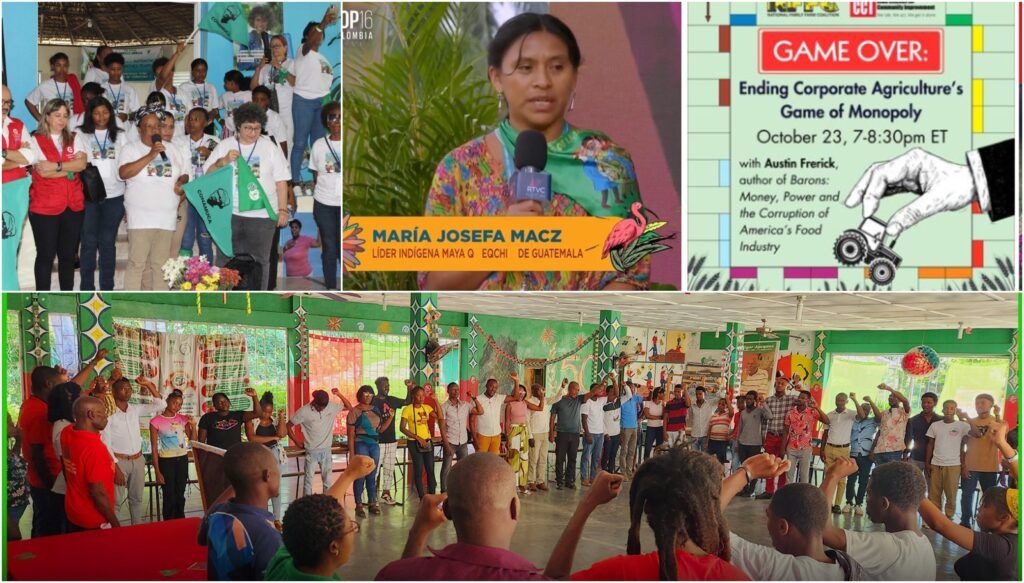
In North Africa and Arab region, the Union of Agricultural Work Committees (UAWC) launched its annual campaign to support Palestinian peasants, both women and men, during the olive harvest season in West Bank, Palestine. In the face of ongoing genocide in Gaza, widespread destruction, and daily settler attacks in the West Bank, this solidarity action, held from October 15 to 31, focused on supporting the olive harvest. This campaign stands as a powerful act of resistance against the relentless attacks and the ongoing targeting of Palestinian sovereignty.
On the occasion of October 16, the FNSA-UMT called for a democratic agrarian reform in Morocco to guarantee food sovereignty and justice for small-scale farmers, free from unjust international agreements and corporate influence. The organization criticized current agricultural policies and demanded the protection of natural resources and support for rural communities, especially women. Additionally, they opposed the privatization of land and water and condemned the use of hunger as a political weapon, offering their solidarity to oppressed peoples, including Palestine.
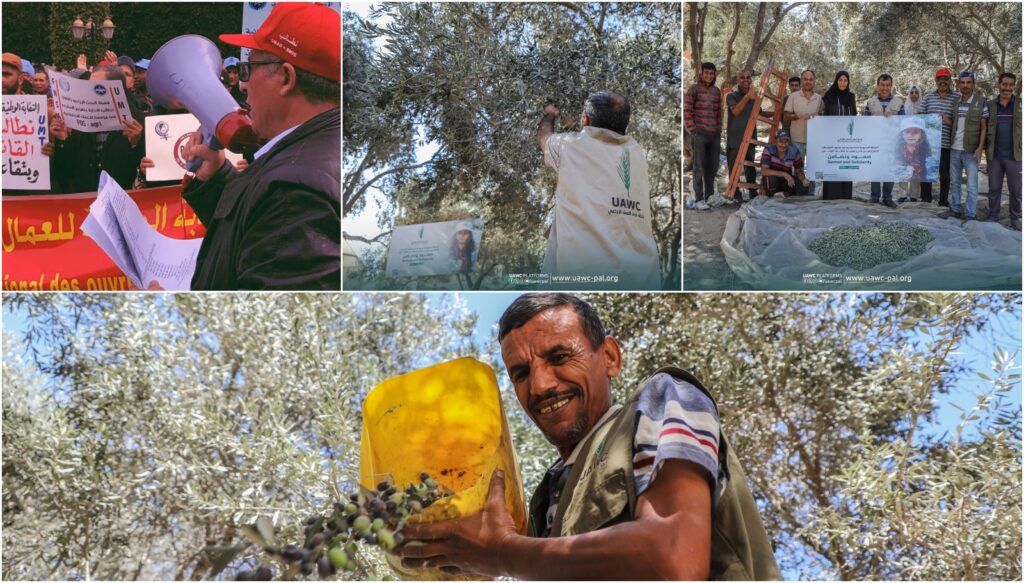
We wrap up this months edition here. If there are any important updates we have missed, please send the links to communications@viacampesina.org so that we can include them in the next edition. We only include updates from La Via Campesina members. For a comprehensive update on various initiatives from October 2024, please visit our website. Previous editions of our news wrap are also available on our website, and condensed versions are accessible as a podcast on Spotify.
